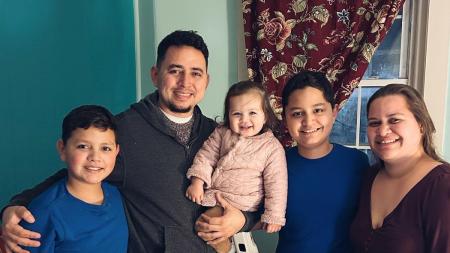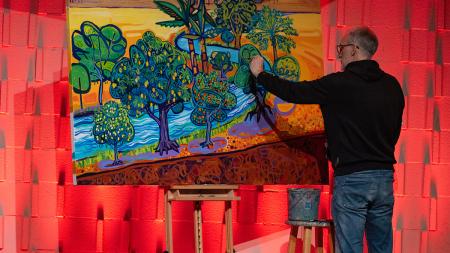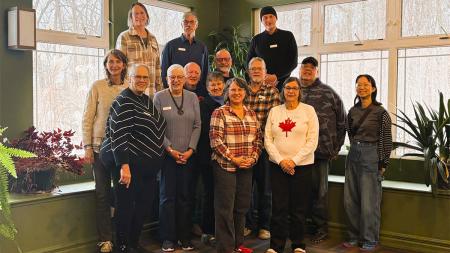Roosevelt Park CRC to Close

Reggie Smith in the sanctuary of Roosevelt Park CRC
Rev. Reggie Smith was the first pastor of Roosevelt Park Christian Reformed Church in Grand Rapids, Mich. Now, more than 20 years later, he will be the church’s final pastor.
After much discussion, prayer and struggle, members of the congregation have decided to close the doors of the church on July 26.
“It was a difficult decision,” said Smith, whose church was the convening congregation for Synod 2013. “This spring we decided to give ourselves two months to see if we could overcome our challenges.”
But faced with a range of ongoing challenges, including dealing with a dwindling membership and finding successful ways to do ministry in a racially mixed urban area, they decided they couldn’t go on, said Smith.
Many of the remaining 100 or so people who attend Roosevelt Park regularly will move their membership to nearby Lee Street CRC, or go elsewhere.
After the final service, the large, imposing brick structure that has sat on the corner of Grandville Avenue SW and Chicago Drive SW for many years will go up for sale.
Smith says the story of Roosevelt Park is actually part of an ongoing story of changes in the CRC.
Roosevelt Park, said Smith, sprang to life out of the merger in 1993 of Grandville Ave. CRC and Bethel CRC. Both the churches trace their histories back many decades and in their heyday had hundreds of members. Roosevelt Park meets in the former home of Grandville Ave. CRC.
“Grandville Avenue was the flagship, Dutch-speaking church in the CRC,” said Smith. “Bethel CRC was part of the next generation and its services were in English.”
For several years, the Roosevelt Park neighborhood was home to scores of Dutch immigrant families.
But in the 1980s and 1990s people from each church were moving into the suburbs, leaving behind their buildings and a decreasing number of members in an increasingly changing neighborhood, said Smith.
“Both churches turned into commuter churches and those left behind didn’t see the next wave of Hispanic immigrants or how they could best do ministry with them,” he said.
When Smith took over the new, merged church, Roosevelt Park CRC had about 500 members and there were high hopes to offer ministry in ways to meet the needs of the people in the neighborhood, located about three miles south of downtown Grand Rapids.
In many ways, they were successful. Roosevelt Park became an important presence in the neighborhood — and in the denomination.
Besides being the host church for Synod 2013 and other events, it served as a training site for many Calvin Theological Seminary students studying urban ministry.
“We have been active in many ways and have always known God was at work here,” said Smith.
The church began Roosevelt Park Ministries, a separate entity from the church, housed in an old bank building, offering language classes, tutors for students, activities for youth, and income-tax assistance for residents.
It also played a role in helping to start the Roosevelt Park Neighborhood Association, of which Smith has been on the board for many years. The association has helped transform homes from apartment dwellings to single-family owned and occupied houses through advocating for rezoning.
Roosevelt Park has also worked tirelessly to stem crime. Once, the church fought with others to get the city of Grand Rapids to revoke the liquor license of a bar where several shootings had occurred. The owner of the bar gave up without a fight and now the building is home to another business.
Roosevelt Park also offered a full-fledged bilingual service in Spanish and, for a couple of years, had a viable Hip-Hop ministry that drew many young people on weekends.
But as time has gone on, various changes and challenges in the neighborhood, in the way that the church structures itself, and in the ongoing need to find the resources to cover costs to maintain the church took a toll.
Roosevelt Park, he said, is an example of what urban churches in the CRC are facing in today’s increasingly multicultural world. In order to survive, they need to make significant changes.
In the case of Roosevelt Park, said Smith, “we tried to do some radical things. Some succeeded and some failed.”
Smith said that he is grateful for his years at Roosevelt Park as a pastor — the marriages he’s performed, the funerals he’s conducted, the services he’s led, the times of “communion we had when we fought over things and then came together.”
Although it is a big change, and he knows how hard this transition will be for some people, he said, “I leave proud that our work didn’t go in vain.
“I stood at the birth of Roosevelt Park and now I stand at the burial. I believe this church had a beginning and now it has an ending.
“We know that only when we embrace death can there be resurrection. I trust God will be doing something new and great here on this corner in the future.”


